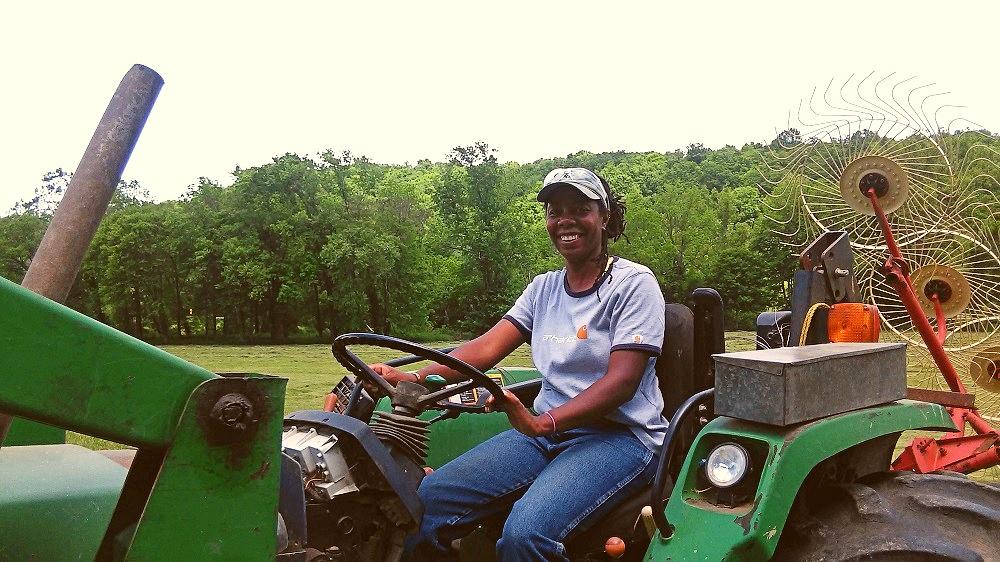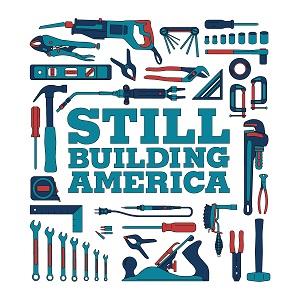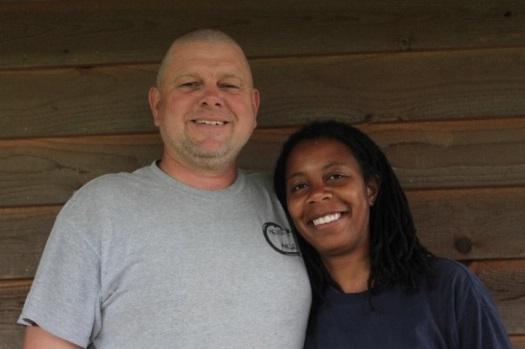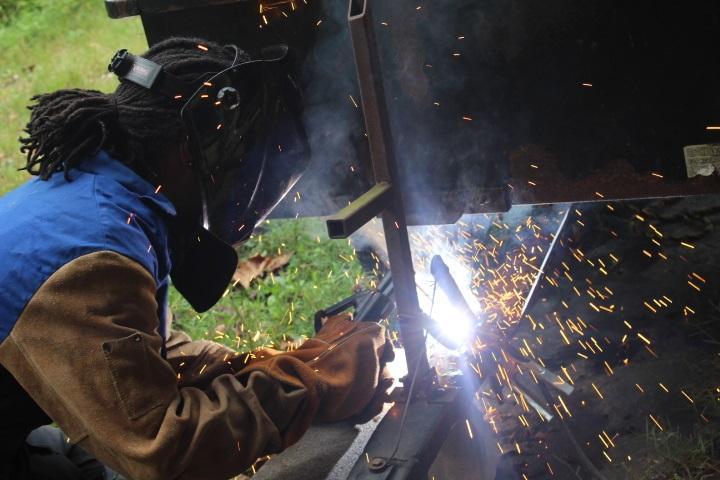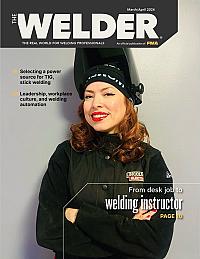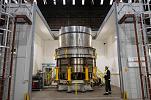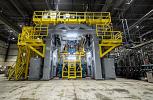- FMA
- The Fabricator
- FABTECH
- Canadian Metalworking
Categories
- Additive Manufacturing
- Aluminum Welding
- Arc Welding
- Assembly and Joining
- Automation and Robotics
- Bending and Forming
- Consumables
- Cutting and Weld Prep
- Electric Vehicles
- En Español
- Finishing
- Hydroforming
- Laser Cutting
- Laser Welding
- Machining
- Manufacturing Software
- Materials Handling
- Metals/Materials
- Oxyfuel Cutting
- Plasma Cutting
- Power Tools
- Punching and Other Holemaking
- Roll Forming
- Safety
- Sawing
- Shearing
- Shop Management
- Testing and Measuring
- Tube and Pipe Fabrication
- Tube and Pipe Production
- Waterjet Cutting
Industry Directory
Webcasts
Podcasts
FAB 40
Advertise
Subscribe
Account Login
Search
Still Building America: Ohio welder, farmer, jack-of-all-trades
Tarheelbilly Farm owner in Great Appalachian Valley spends days welding, sheepherding, weaving, teaching
- By Darla Welton and Josh Welton
- October 5, 2019
Not only is Charis Walker still building America, she’s farming it too. Her growing interest in farming developed right alongside her path in the skilled trades world. Eventually her education and life experience led Charis and husband, Ben, to establish their homestead and begin farming full-time in southern Ohio.
Charis, a North Carolina native, spends her days sheepherding, cultivating, shearing, weaving, welding, and homeschooling her daughter in the rolling hills of the Appalachian range on Tarheelbilly Farm.
Darla Welton: When you mentioned that you had worked as a full-time welder and that now you are a farmer, I knew that I had to dig a little deeper and share your story.
Charis Walker: Yes, I am currently a full-time farmer. I raise sheep, goats, cattle, and chickens on a farm that I co-own with my husband, Ben. He taps maple trees and keeps honeybees.
DW: And how many years did you work as a full-time welder before that? What type of welding work were you doing?
CW: I worked as a full-time welder for three years, welding in the fabrication shop of a major forklift company. I learned to operate and maintain a welding robot in addition to welding structural parts. I was pretty proud of that. Eventually I moved from the floor to a position in supply chain, working as a production scheduler for a very busy product line. I missed working in the fab shop, but I enjoyed the challenge and got to work with the guys back in the fab shop on a regular basis.
DW: How did you move from working as a full-time welder to starting/operating a farm full-time?
CW: The first spring after my husband and I married, I started acquiring chickens and began gardening. We lived in North Carolina. Over the first few years, we started keeping bees and I bought goats, then a Jersey cow. Tarheelbilly MicroFarm was born and we started planning for a larger farm. We kept the cow on our neighbor's property, and Ben learned to make maple syrup by tapping maple trees on his family’s Ohio farm. He’d bring the sap back to our house in N.C. and then boil it on a fire pit that he built in the backyard.
I'd wanted to farm when we met, so I started learning on our small ½-acre property and just bloomed where I was planted. While I was a full-time welder, I still milked my goats every day and tended the garden. We didn’t have a ton of space to grow as much as we wanted. Our neighbors were gracious enough to allow us to pasture our goats on their land in the summer, but we didn’t have the space to farm in earnest.
After my husband retired from the military, he wanted to return to his family’s farm in southern Ohio. He had toyed with tapping maple trees on that property, but moving allowed him to build that operation and expand our apiary for beekeeping. It also afforded me the opportunity to raise sheep and a few cattle, and it gave our goats much-needed space.
DW: Who influenced your welding and farming?
CW: My grandparents were farmers. They raised a large garden each year and preserved a great deal of food for the family. My dad was a tool- and diemaker for a tool company, and my mom also worked in manufacturing. Despite growing up around trades and farming, I never saw a woman drive a tractor and I never considered learning a trade growing up. I didn’t know women who farmed, welded, or who were machinists. It wasn’t until I got older, earned a few college degrees, and entered the workforce that I learned how cool and well-paying trades were. It was life experience that taught me that I needed to learn a few new skills.
DW: What type of welding training did you have?
CW: I took welding through adult continuing education classes at the local community college. A supertalented welder named Silvando Perez taught me. I was the only English speaker (and female) in my class. I took more continuing education welding courses where I was exposed to MIG and TIG. I enjoyed it so much that I eventually enrolled in the welding program.
I got hired as a welder midway through my first semester. After I worked at the plant for a while, I went back to the community college to learn more about robots. I took classes in PLCs, hydraulics, motors, and basic electricity. Had we not moved to the farm, I planned to pursue a career in industrial maintenance or robotics. Ironically, those classes now help me understand how my equipment works, enabling me to maintain the machines better and adapt equipment to new purposes. I consider myself to be a lifelong learner. I am not afraid to try new things and I’m not afraid of failing at something until I master it.
DW: What type of repair work do you do most around the farm?
CW: Since our equipment is older and some of it is a mish-mash of components, I fix a lot of old welds or add reinforcement to machinery that has seen better days. Some things we fabricate out of old implements that won’t otherwise work with the tractor that we have here. Ben handles all of the woodworking projects.
DW: You mentioned that you still do some fabrication projects for fun. What type of things have you done?
CW: Welding itself is fun, so I’m always game to build something. The biggest project I’ve done so far is fabricating the stove for my husband’s maple syrup operation. I have fixed trailers and a host of implements for the tractors. I have a pretty big repair looming for the tractor, and we have plans to fabricate the handling equipment for the sheep and corral panels for the cows. My husband is the design guy. It’s nice to be able to design and build things to your own specifications.
DW: Do you have a favorite welding/fabrication project or welding achievement of which you are particularly proud?
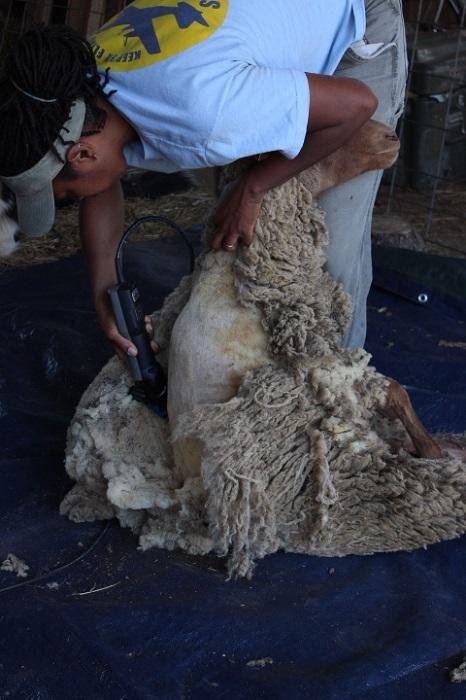
Charis Walker raises sheep, goats, cattle, and chickens on her Tarheelbilly Farm in Southern Ohio. Photo provided
CW: I am most proud of welding critical components at my previous welding job. There weren’t a lot of women welding where I worked, and it felt like a big deal to have a small woman weld huge beams of metal. Not only were the welds structurally integral, but there were aesthetic considerations too. It filled me with pride to see the parts I welded on completed trucks, my identification stamp prominent enough for me to see. I can go into big-box stores and show my daughter the parts that I welded on certain forklifts. That’s cool.
DW: What has been the most challenging part of operating your farm? And what is the most rewarding?
CW: Working for myself can be rough—I can be very hard on myself and can easily overwork if I am not too careful. A farm never stops, and there is always more work to do. The biggest challenge is giving myself permission to take a day off.
Eating a meal prepared 100 percent from what is grown or raised on the farm is quite rewarding, though. Welding/fabricating/repairing something for the farm to make it work the way it was intended is also rewarding.
For me, farming is about connection—with my farming ancestors, my farming grandparents, my family, my community, and with the environment. In a time when so many are disconnected from their food, fiber, and the natural world at large, my farm provides an opportunity to share and educate people about food. Perhaps educating was not a responsibility of farmers a generation ago, but the "why" I raise heritage livestock is just as important as the "how."
DW: I want to touch a little on your experience as a woman of color who has worked in the welding and fabrication world. Did you face any particular challenges?
CW: Initially, I think my primary challenges were mental. I wanted to be taken seriously as a welder, so I worked very hard to prove that I could do my job in the same way the guys did. I didn’t want help lifting parts, moving stuff, or welding—I wanted to do it myself. I am stubborn and I wanted to be treated like anyone else. I think I earned the respect of the guys who worked with me because I could stand the heat, I worked hard, I showed up ready to work every day, and I was serious about learning the craft. I also didn’t want to have the worst welds in the shop, so I worked hard to be a good welder. I don’t think I was treated any differently than the average newbie welder. I just had to prove that I could actually weld.
I had some great guys mentor me when I got started, and worked with some amazing welders. They taught me how to go from welding in a lab setting to how to really burn wire. I really appreciate that. I had a great time working in the fab shop and I am still friends with a few of the guys I worked with.
DW: What advice would you give to young girls who are considering skilled trades opportunities or even farming?
CW: I wish that I would’ve known that I didn’t have to choose between college and trades. I loved math and physics in high school, but I wasn’t interested in going into engineering. I really didn’t know there were cool opportunities out there that would engage my curiosity and intellect and would allow me to pursue higher education.
A lot has changed since I graduated from high school. There are apprenticeships, dual enrollment, and other flexible opportunities that allow kids to graduate from high school with both skills and degrees. I would advise girls to consider such opportunities. Trades offer tremendous opportunity for financial stability and upward mobility. For those girls who love math and science, welding/machining/robotics (and trades in general) can provide a pathway to integrate those interests and can open doors to careers in engineering, quality, design—the sky is the limit.
DW: What's your future goal or dream?
CW: Right now I am focused on growing and improving my flock of Tunis sheep. I started my flock three years ago, and though I had goats for many years before starting with sheep, I still have a lot to learn. I have several repair and fabrication projects on the horizon, so I have ample opportunity to burn rods and wire around here. My husband has plans to expand his maple operation, so I’ll get to TIG weld quite a bit of stainless too. I homeschool my daughter, so working 50-60-hour workweeks isn’t in the cards for me right now. I toy around with pursuing opportunities that would allow me to work shutdowns a few times a year. Right now I am content farming and keeping my skills sharp whenever I can.
Follow Charis and Tarheelbilly Farm on Facebook and Instagram.
Check out more from the Still Building America series.
subscribe now
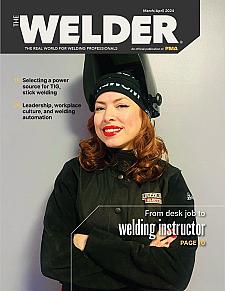
The Welder, formerly known as Practical Welding Today, is a showcase of the real people who make the products we use and work with every day. This magazine has served the welding community in North America well for more than 20 years.
start your free subscriptionAbout the Authors

Josh Welton
Owner, Brown Dog Welding
(586) 258-8255
About the Publication
- Stay connected from anywhere

Easily access valuable industry resources now with full access to the digital edition of The Fabricator.

Easily access valuable industry resources now with full access to the digital edition of The Welder.

Easily access valuable industry resources now with full access to the digital edition of The Tube and Pipe Journal.
- Podcasting
- Podcast:
- The Fabricator Podcast
- Published:
- 04/16/2024
- Running Time:
- 63:29
In this episode of The Fabricator Podcast, Caleb Chamberlain, co-founder and CEO of OSH Cut, discusses his company’s...
- Industry Events
16th Annual Safety Conference
- April 30 - May 1, 2024
- Elgin,
Pipe and Tube Conference
- May 21 - 22, 2024
- Omaha, NE
World-Class Roll Forming Workshop
- June 5 - 6, 2024
- Louisville, KY
Advanced Laser Application Workshop
- June 25 - 27, 2024
- Novi, MI
























